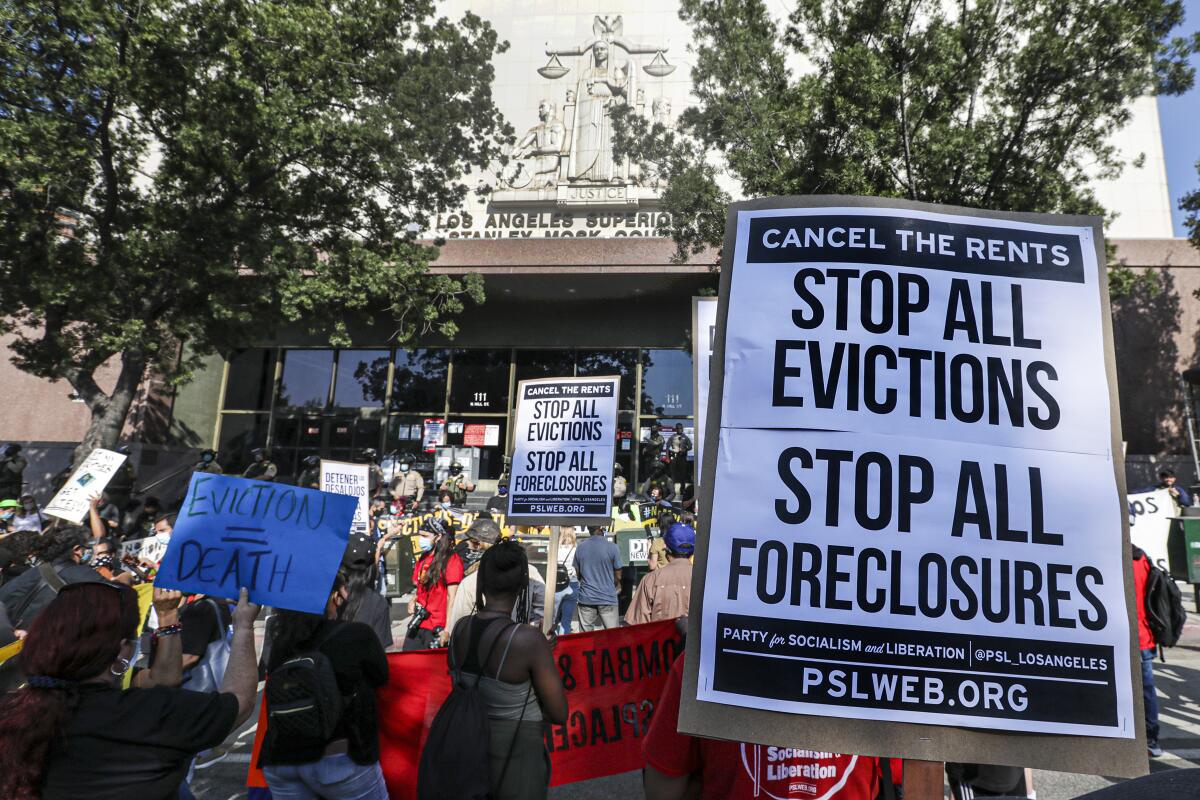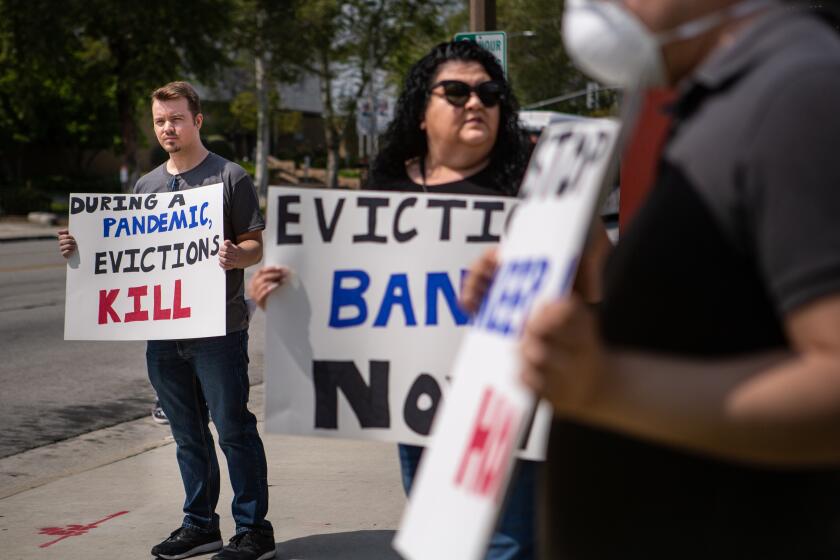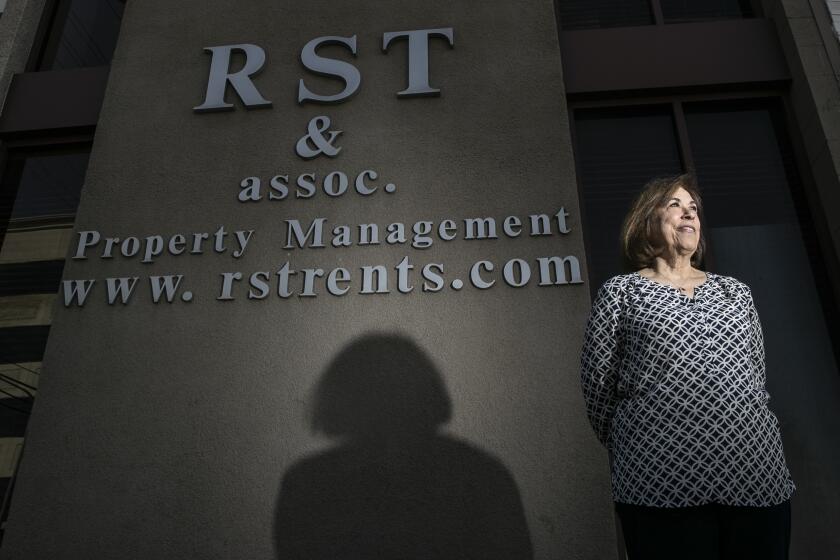Federal judge strikes down CDC’s national moratorium on evictions

- Share via
A federal judge blocked a nationwide eviction moratorium the U.S. Centers for Disease Control and Prevention established last year as COVID-19 lockdowns put millions of renters out of work.
U.S. District Judge Dabney Friedrich in Washington said Wednesday that the agency exceeded its authority by issuing a broad moratorium on evictions across all rental properties. “The CDC order must be set aside,” she said in a 20-page opinion. In recent months, other judges issued rulings blocking the ban in certain jurisdictions. Friedrich’s decision goes further, saying the entire ban should be overturned nationwide.
The ruling is a setback for the Biden administration, which also has seen its proposed freeze on deportations halted by a court. The White House is facing several other legal challenges, including on offshore drilling, on the Keystone XL pipeline permit and on COVID relief legislation from Republican-led state attorneys general.
Renters have been protected against eviction by a patchwork of state and federal laws. That means in many places tenants who’ve fallen behind on rent are still covered by other measures.
A federal judge ruled the CDC has no authority to declare a nationwide eviction moratorium during the COVID-19 pandemic. What does this mean for renters?
In California, residential tenants with a pandemic-related hardship cannot be evicted over nonpayment of rent until July at the earliest. A Los Angeles rule gives such tenants within city limits extra time to pay the rent they owe.
The Justice Department immediately moved to appeal Friedrich’s Wednesday decision. “Scientific evidence shows that evictions exacerbate the spread of COVID-19,” said Brian Boynton, the acting assistant attorney general for the civil division. “The harm to the public that would result from unchecked evictions cannot be undone.”
Eric Dunn, director of litigation at the National Housing Law Project, said the U.S. should move quickly to overturn the ruling or risk “mass evictions just as we seem to be on the verge of reaching herd immunity in the U.S.”
But landlord groups welcomed the judge’s decision. Paula Cino, vice president for construction, development and land-use policy at the National Multifamily Housing Council, said the country is in a far different place than it was early in the pandemic. By continuing the CDC moratorium, she said, the federal government was “ignoring the progress made.”
Millions of Americans, especially low-income tenants, are accumulating debt amid the COVID-19 pandemic, threatening to create a downward financial spiral.
The CDC moratorium, first enacted by President Trump and extended by President Biden, was designed to prevent mass evictions in the face of a public health emergency that saw millions of Americans lose their jobs and fall deeper into debt. Officials also warned that ejecting swaths of renters during the U.S. winter would exacerbate the virus’ spread.
Still, it came with loopholes that allowed evictions to move forward in states and cities that didn’t enact their own more stringent rules.
While government measures sought to prevent mass homelessness, there was no targeted help for mom-and-pop property owners who provide much of America’s affordable housing. For these landlords, mortgage, maintenance and tax bills have been piling up, putting them in danger of losing their property or being forced to sell to wealthier investors hunting for distressed deals.
New data show how property owners in Los Angeles — especially mom-and-pop landlords — are having trouble paying mortgages and keeping up with maintenance costs as their tenants miss rent.
The Biden administration has been trying to unwind the financial stress caused by the pandemic. The Treasury Department is in the process of getting almost $47 billion in relief out to states and municipalities to help people cover rental arrears and unpaid utility bills.
But the rollout has been moving slowly and varying from state to state. The ban, first enacted in September, was supposed to expire at the end of the year but was extended through June to give more time to get the money flowing before protections ended.
Some property owners have argued that eviction bans leave them saddled with tenants who were delinquent even before the pandemic.
The U.S. asked Friedrich to limit any block on the ban to the specific plaintiffs in the case, rather than issue a broad nationwide order. But Friedrich ruled that the entire prohibition must be set aside.
In her ruling, the judge acknowledged that the Department of Health and Human Services and the CDC have “broad authority” to enact regulations that prevent the spread of disease. Still, she said, their power is limited to inspecting, fumigating, disinfecting, sanitizing, exterminating or destroying infected “animals or articles” that pose a danger to humans.
Friedrich, a Trump appointee, isn’t the first judge to weigh in on the CDC moratorium.
In February, a federal judge in Texas ruled that the federal government’s power to regulate interstate commerce under the Constitution doesn’t give it the right to impose a moratorium on evictions. But that ruling and a similar order in Ohio had only limited reach.
Times staff writer Andrew Khouri contributed to this report.
More to Read
Inside the business of entertainment
The Wide Shot brings you news, analysis and insights on everything from streaming wars to production — and what it all means for the future.
You may occasionally receive promotional content from the Los Angeles Times.












